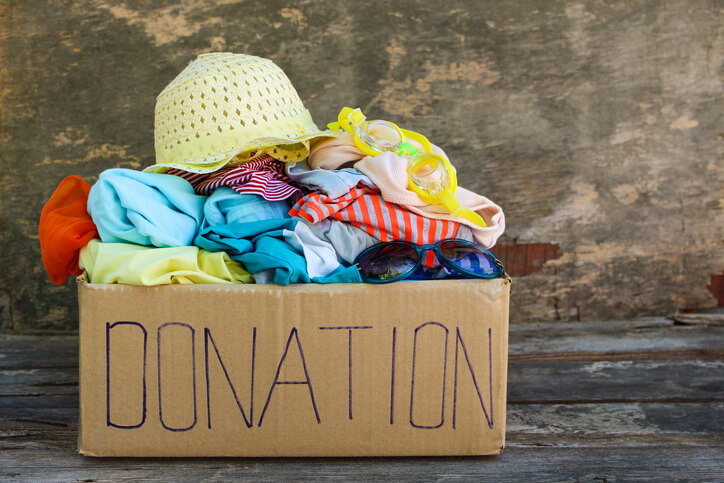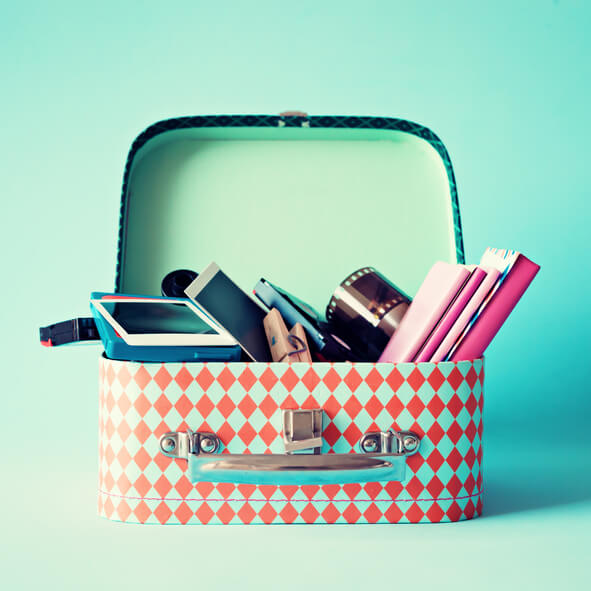The idea of downsizing can feel overwhelming—sorting through years of belongings and deciding what stays and what goes is no small task. But it’s also an opportunity: a chance to reassess what truly matters and lighten your load for the next chapter. For many people, the choices are the tricky part, particularly if the possessions create nostalgia or hold sentimental value. These could be gifts, inherited items or things associated with people, places and memories from your past.
Depending on the amount of space in your new home, you likely won’t need to let go of all the sentimental belongings. You probably enjoy having some—or many—of them in your home. The challenges can arise when you’re considering possessions you don’t need or even necessarily like. However, you may feel obligated to keep these items or guilty and conflicted about giving them away. But if you’re committed to downsizing your belongings, there are lots of ways to make it easier. Here are some methods for dealing with those items you just can’t seem to let go.
Know Yourself
When you start to downsize and declutter, you may get stuck on objects you don’t use and would happily get rid of but for the fear you might regret it. Possibly. Someday. While it may seem difficult to get past this, challenge yourself to think about which specific things you have regretted parting with in the past. Chances are there aren’t many. Those you can recall likely fall into a pattern. By understanding and respecting this pattern, you can determine what you’ll regret giving up and how to prevent it.
For example, maybe you wish you’d kept all your college textbooks or every novel you’ve ever bought, not because you want to re-read them, but because you don’t like forgetting what you’ve read in the past. Going forward, you can feel free to give away old books after writing down all their titles or keeping track of your read books on an app like Goodreads.
Moving forward, applying clear rules or guidelines that you create regarding how and why you’ll choose what to keep and what to discard. Perhaps you keep one souvenir from each place you’ve visited and donate clothes that no longer fit.

Tell a Different Story
Sometimes, it may be easier to part with nostalgic or long-held possessions by mentally re-framing and re-writing the story you tell yourself about them. If you spent a lot of money on a special dress, and feel you should have worn it more, tell yourself you paid for the wonderful experience of wearing it—even if it was just once. If you’re holding on to items that represent a former lifestyle, job, clothing size, or hobby, think about how useful those items were in the past, how lucky you were to have been able to have them then, and how now that that era of your life is over, you and the items are naturally moving on. And if you donate them, someone else will have the benefit of enjoying them and creating their own stories.
Save Selectively
Even when you can’t—or don’t wish to—save everything, you can usually save something. Choose one item to represent a set such as one particularly unique stuffed animal out of a massive collection. This often makes it easier to properly display and appreciate it and to recall the memories it holds. When saving just one object out of many won’t work, you might be able to save a select part of an item. Say you have fond memories of wearing an old coat, but now it’s tattered, out of style and you haven’t reached for it in years. Rather than storing the coat indefinitely or throwing it away and feeling sad, you could instead salvage its pretty buttons and use them to replace the plain buttons on a newer piece of clothing. The result could strike a balance between preserving nostalgia and successfully achieving your downsizing goals.
Another option that lets you retain the sentiment of items without taking up any space is to scan them (if they’re documents) or photograph them (if they’re bulkier items). This enables you to look at them and reminisce without having to find room for them in your home.
Let Go of Gift Guilt
Gifts can be some of the most difficult items to let go, and the reason may be two-fold. It could be they have meaning because of who gifted them to you, but it could also be due to a fear that you may offend the giver. This feeling can be internal, as in the sense that you’re not a good friend because you don’t like the gifted item as much as you should. It can also be about real or anticipated external consequences—what if the giver asks about the item or comes over and notices that it’s not there? In many cases, this can be less about the gift itself, and more about the relationship you have with the person who gave it to you.
If you want to minimize gifts given to you in the past, remind yourself that after properly thanking the giver at the time, you’ve done your part. Few givers really expect you to keep a gift forever. They want you to enjoy the item, not to stress out every time you see it hanging on the wall. Still, there may be instances when someone may be offended or have unusual expectations. For your own peace of mind, it can help to have an answer ready in case they do note the gift’s absence. “Oh yes, I remember that painting well. I enjoyed it for many years, then when I moved I didn’t have room for it. Fortunately I donated it so someone else could enjoy it, too. It really is so kind how you always remember my birthday.”
In the future, you can let loved ones know what kind of gifts you prefer. Try expressing your newfound appreciation for lovely things that just happen to be ephemeral or consumable, like experiences, flowers or wine.

Focus on Giving
If you feel that it’s wasteful to throw things away, or difficult to let them go, ease your feelings by concentrating instead on what you can give to someone else. When you downsize the possessions of your home, you will probably find many things you can donate to charity or give away to friends. When you focus on how much someone else can use or enjoy your things—especially someone who couldn’t afford or find the item otherwise—you replace the sadness of “abandoning” a nostalgic object with the good feelings of helping a stranger or surprising a loved one with an unexpected gift.
Plan Your Downsized Future
As you go through these exercises, you may feel like it’s all about endings: the end of an era, perhaps, or of a particular item’s lifespan. It’s also an opportunity to think about how you plan to live with less belongings or less attachment to material things in the future. As you sort your things into piles to throw away, donate, or keep, imagine how you’ll go forward. Maybe you’ll decide to replace souvenirs with photographs as memories of your travels. Perhaps you’ll choose to shop for fewer clothes, or to only purchase one item if you donate another. Could you experiment with a new decorating style that celebrates clean lines and open areas? When you see downsizing as less about what you’re giving up and more as the beginning of an exciting new way of living, you may start to feel much better about relegating things to the “no” pile.
While the overall process can be hard work, the goal is to improve your life. Living in a home with objects you truly no longer like or use can be an energy drain and a mental distraction. So perhaps looking at the exercise as a positive and energizing effort will help as you make decisions about the items you own and what you truly may be able to let go.







